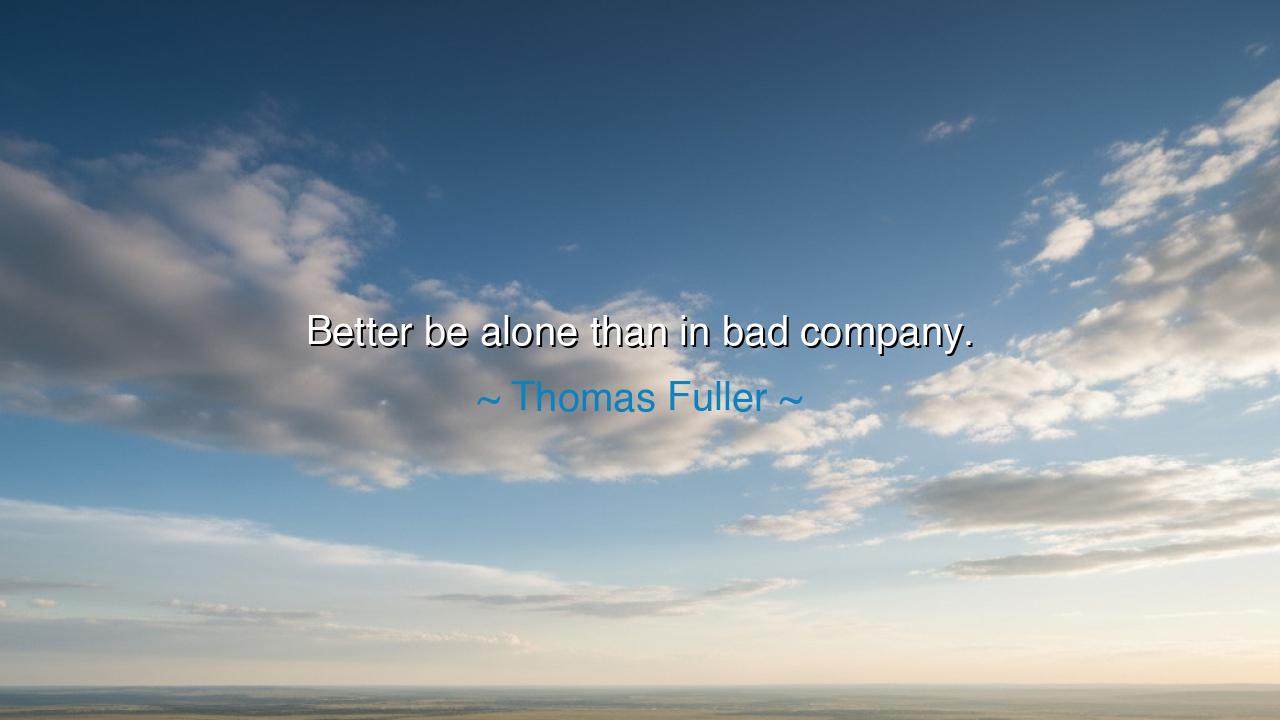
Better be alone than in bad company.






"Better be alone than in bad company." These wise words of Thomas Fuller offer a timeless lesson about the importance of association and the influence of those with whom we choose to share our lives. In every era, the company we keep has shaped the course of our lives, and Fuller’s advice speaks to the power of our social circles. For even the strongest of individuals can be led astray by the wrong influences, while solitude, though often feared, can offer a clearer path to personal integrity and growth. To be surrounded by those who are toxic or whose values clash with your own is to invite corruption into your soul. It is better, he says, to stand alone—to walk the solitary path of truth—than to allow your spirit to be swayed by false or corrupt influences.
In the ancient world, the wise men and philosophers recognized the immense power of association. Socrates, in his pursuit of knowledge, was selective in the company he kept. He believed that to be surrounded by people who did not seek truth or who engaged in self-deception was a hindrance to philosophical growth. His life was spent in dialogue with those who sought understanding, and he cautioned that true wisdom cannot flourish in the company of those who are trapped in ignorance. Even in friendship, Socrates understood the need for virtuous companions—those who would challenge, encourage, and uplift his understanding, rather than drag him into the shadows of moral compromise.
Consider the ancient warriors who knew the importance of the alliance they forged. Alexander the Great, though a mighty leader, understood the significance of the people he surrounded himself with. His generals and strategists—men like Ptolemy and Hephaestion—were not just warriors but partners in his vision. They shared his ambition, his integrity, and his drive for greatness. Had he been surrounded by men of weaker character or conflicting interests, his empire may never have reached the heights it did. Just as the soldier’s armor protects the body, so too does the company we keep protect the mind and spirit. To align oneself with those who share one's ideals and purpose is to forge a life of strength and purpose.
In contrast, the story of Julius Caesar and his political alliances shows the danger of surrounding oneself with those who do not share one’s higher vision. Caesar’s rise to power was marked by his cunning alliances, yet he was ultimately betrayed by those who had once been his closest companions. Brutus and the other conspirators, driven by personal ambition and fear, turned against him. The moral lesson here is that even in the world of power and politics, those who associate with the wrong company—those who lack loyalty or virtue—are bound to find themselves in peril. Caesar, for all his greatness, learned too late that the company we keep shapes our destiny.
The lesson in Fuller’s words is not simply one of isolation but one of discernment. It is a call to recognize that quality of companionship far outweighs quantity. While there are times when solitude may feel burdensome or lonely, it is far more dangerous to be surrounded by those who lead us astray, who pull us into the quicksand of deceit or moral decay. The strength of a person lies not only in their own character but in the wisdom to choose their company wisely. Solitude offers the opportunity for reflection, growth, and the pursuit of one's highest ideals. In the company of the wise, we can achieve great things, but in the company of the wicked, we risk losing our way.
In our own lives, we must ask ourselves: who do we allow to walk beside us? Who do we choose to accompany us on our journey? Are they people who encourage us to rise to our best selves, or do they pull us into the shadows of mediocrity and compromise? It is easy to be swayed by the crowd—to seek approval, to want companionship—but Fuller’s wisdom reminds us that true growth comes not from the number of people we have around us, but from the quality of those who walk with us. Choose wisely, for the company we keep is often a mirror of who we become.
Thus, Fuller’s lesson is one of profound self-respect and discernment. To walk alone is not to be without strength, but to be in control of one’s path and purpose. It is better to stand alone, with integrity, than to walk with those whose values do not align with our own. The wise know that the company we keep shapes our character and our destiny. Let us strive to seek the companionship of those who inspire us to be better, who help us rise above our fears and limitations, and who walk in alignment with our highest ideals. For in such company, we find strength, purpose, and the courage to live our truth.






AAdministratorAdministrator
Welcome, honored guests. Please leave a comment, we will respond soon